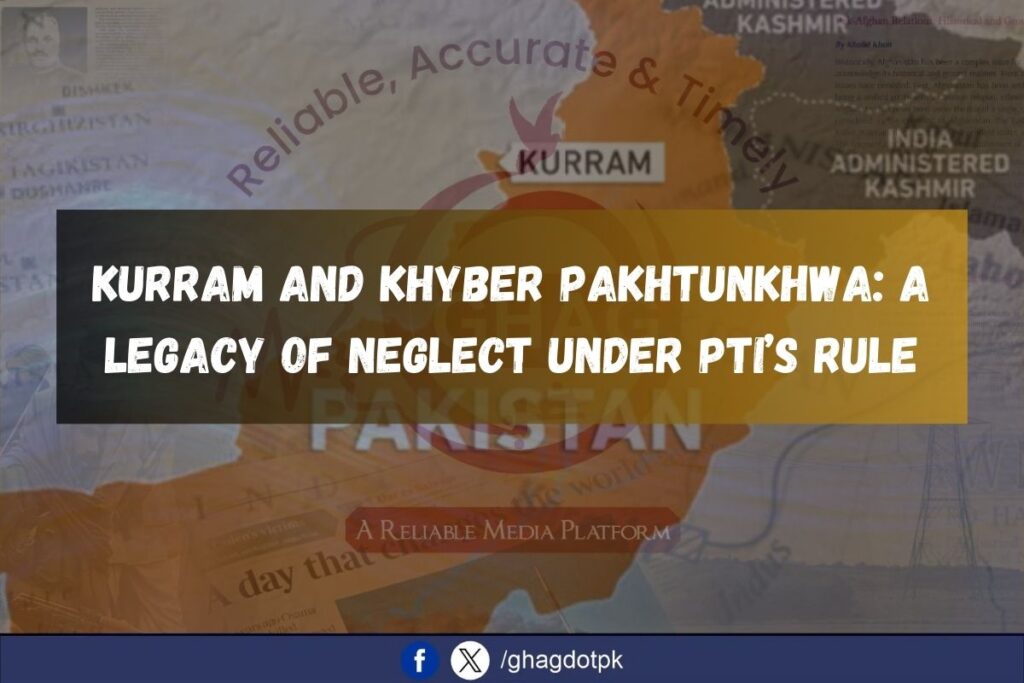Ghag Special Report
Kurram, a region once rich in cultural significance and historical importance, now stands as a tragic symbol of governance failure under the leadership of the Pakistan Tehreek-e-Insaf (PTI) party. Over the course of PTI’s three consecutive terms in power in Khyber Pakhtunkhwa (KP), the province has seen not only its security deteriorate but also its people left vulnerable to the growing menace of terrorism and extremism. In this context, Kurram has become the epicenter of PTI’s governance failures, marked by neglect, political indifference, and a complete disregard for the region’s critical development needs.
Khyber Pakhtunkhwa, under PTI’s rule, has witnessed a disturbing surge in terrorism, with the party’s leadership allegedly giving a soft corner to Taliban militants. Instead of taking decisive action to secure the region, PTI’s government has been criticized for appeasing terrorist groups, allowing them to establish a stronghold in the province. Thousands of Taliban fighters have found refuge in Khyber Pakhtunkhwa, including in Kurram, where their presence continues to destabilize the region. Despite promises to combat terrorism, PTI has failed to deliver, with the Taliban’s influence growing stronger by the day.
Kurram, in particular, has paid a heavy price for PTI’s misguided policies. The region, which once held promise for economic growth and peace, has become a zone of continuous conflict and despair. The PTI-led provincial government’s failure to take action against terrorist elements has left the people of Kurram living in constant fear. Attacks, ambushes, and targeted violence have become everyday occurrences, further exacerbating the region’s suffering. What’s worse is the provincial government’s inability to bring about meaningful change, leaving Kurram to fend for itself in the face of mounting threats.
In addition to its failure on the security front, PTI’s disregard for development in Kurram has contributed to the region’s ongoing crisis. While the provincial government has focused its attention on political squabbles, the people of Kurram continue to suffer from inadequate infrastructure, insufficient healthcare facilities, and a lack of educational opportunities. Basic services that many other regions take for granted are either outdated or absent in Kurram, which has stifled any hope for progress. The lack of investment in the region has left the population in a state of stagnation, contributing to a growing sense of disillusionment and frustration.
Despite these pressing issues, PTI’s leadership has prioritized political distractions over the region’s welfare. National issues, such as the release of Imran Khan and the focus on Islamabad’s political turmoil, have taken precedence over the well-being of Khyber Pakhtunkhwa’s citizens. Public protests have become a common sight, as the people of Kurram and other areas of the province express their dissatisfaction with PTI’s failure to address their concerns. Rather than focusing on governance, PTI has become embroiled in power struggles that divert attention from the real issues on the ground.
The PTI government’s failure to act decisively against terrorism has only exacerbated the problem. The soft handling of militants and their growing influence in the province has given rise to a vicious cycle of violence that shows no signs of abating. Instead of taking a firm stand to dismantle these groups, PTI has allowed them to thrive, further destabilizing the region.
Kurram’s suffering is not an isolated incident but a reflection of PTI’s broader governance failures in Khyber Pakhtunkhwa. The lack of attention to the region’s security, development, and social needs speaks to a deeper issue within PTI’s political priorities. The people of Kurram, like those across the province, have been left to bear the brunt of bad governance, political mismanagement, and a failure to deliver on promises made during electoral campaigns.
In conclusion, Kurram’s ongoing tragedy is a direct result of PTI’s inability to govern effectively. The failure to address security challenges, invest in development, and take meaningful steps to tackle extremism has left the region in a state of perpetual crisis. Until PTI shifts its focus from political theater to addressing the real needs of Khyber Pakhtunkhwa’s citizens, the region will continue to suffer, and the cycle of violence and neglect will persist. Kurram, along with the rest of Khyber Pakhtunkhwa, deserves better than empty promises and political distractions—it deserves genuine leadership and a commitment to peace, security, and development.






